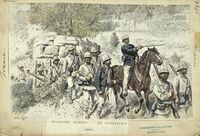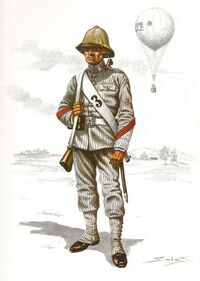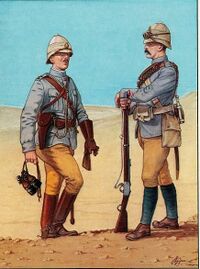First Great War
This article is a work-in-progress because it is incomplete and pending further input from an author. Note: The contents of this article are not considered canonical and may be inaccurate. Please comment on this article's talk page to share your input, comments and questions. |
| First Great War | |||||||
|---|---|---|---|---|---|---|---|
 Clockwise from top right: Acirian forces retreating from Zilemia; Capetian revolutionary soldiers in an ambush of Kiravian colonial convoys; Aliança heads of state gathering in Alahuela; Caphirian heavy artillery near Constanz | |||||||
| |||||||
| Belligerents | |||||||
|
The Aliança |
Concordiae Powers | ||||||
The First Great War, also called Saint Brendan's War in Kiravia, was a global war that lasted from 1896 to 1902. It also included a major civil war in Urcea which was partly related to the conflict. The war was primarily restrained to Occidental powers, and in many cases the conflict was the result of disputes, claims, and rivalries dating back more than a hundred years.
By the end of the war, Caphiria had largely succeeded in establishing hegemony in Sarpedon. It annexed Veltorina and forced Cartadania and Pelaxia into a humiliating peace. In Crona, Alstin and Kiravia managed to make gains against Burgundie in the islands off of Crona and the last of it mainland Cronan holdings, but failed to severely damage the Burgoignesc global colonial empire elsewhere; In particular its major possessions in Vallos. Crona also saw brief fighting in the southeast that resulted in the establishment of the Cape as an independent state. Levantia was the sole theater in which Caphiria and its allies were largely defeated, as Aliança-aligned House de Weluta was restored to the Urcean throne against the Caphirian-supported regency of Gréagóir FitzRex.
Although the war ended in favor of the Concordiae Powers, the resulting peace was far from conclusive. Caphiria had failed to obtain Lariana from Urcea, inaugurating a series of diplomatic and military schemes that coalesced into the Ten Year Plan. Cartadania and Pelaxia began to chafe under Caphirian hegemony, seeking Levantine allies in the future in the event of a future conflict. The various unresolved issues of the war, combined with the lack of any kind of international mediating organization, set the groundwork for a Second Great War to be fought three decades after the end of the first.
Background
Sarpedon Theater
Capelranco Campaign


The Capelranco Campaign from October 17, 1897 - June 25, 1898 was a series of naval battles, blockages, and amphibious landings undertaken by the Caphirian and Kiravian navies to contain the Navy of Burgundie's western fleets in the Capelranco Archipelago and generally in Equatorial Ostiecian waters. The joint Caphiro-Kiravian strategy was to engage Burgoignesc Security Forces every few months in an effort to keep Burgundie on the defensive. The campaign was a success, with 60% of forces garrisoned in Equatorial Ostiecia remaining in the constituent country throughout the campaign, allowing Caphiria to largely fight a one-front war in Sarpedon. On June 25th, in the Battle of Catavis Cut, the Navy of Burgundie broke the back of the Caphiro-Kiravian forces and ended the campaign.
Global Theater
Emirati War


Between Burgundie, the Emirate of Apfumhat. and eventually the Sultanate of Pursat. 1871-1887.
1880s Observation balloons, the first recorded use of a lighter than air vehicle to drop a device for a military purpose. Dropped a fused grenade.
War of St. Brendan's Strait

The culmination of the Kiro-Burgoignesc Wars, the War of St. Brendan's Strait was a conflict between Burgundie and Kiravia to settle territorial disputes in the confluences of the Odoneru Ocean, Tainean Sea, and Polynesian Sea, or as landlubbers would call it, the island chains between Crona and Sarpedon. The war lasted for a year and a half, from March of 1895 through August of 1896. Due to the equatorial climate and the advancement of technology, it was fought year-round, one of the first wars to do so in the Occidental canon, and is considered, along with the '97 Rising to mark the beginning of truly mechanized/modern warfare. It saw the first use of machine guns used by occidentals, against occidentals, solidified the preference for the pre-dreadnought over ironclads for naval ships of the line for "big gun navies" like Kiravia and Urcea, and the development of Jeune École by the Navy of Burgundie.
Capetian revolution
'97 Rising in Urcea
Washakara War
War in the Orixtal and the Veroui Revolt
TBA